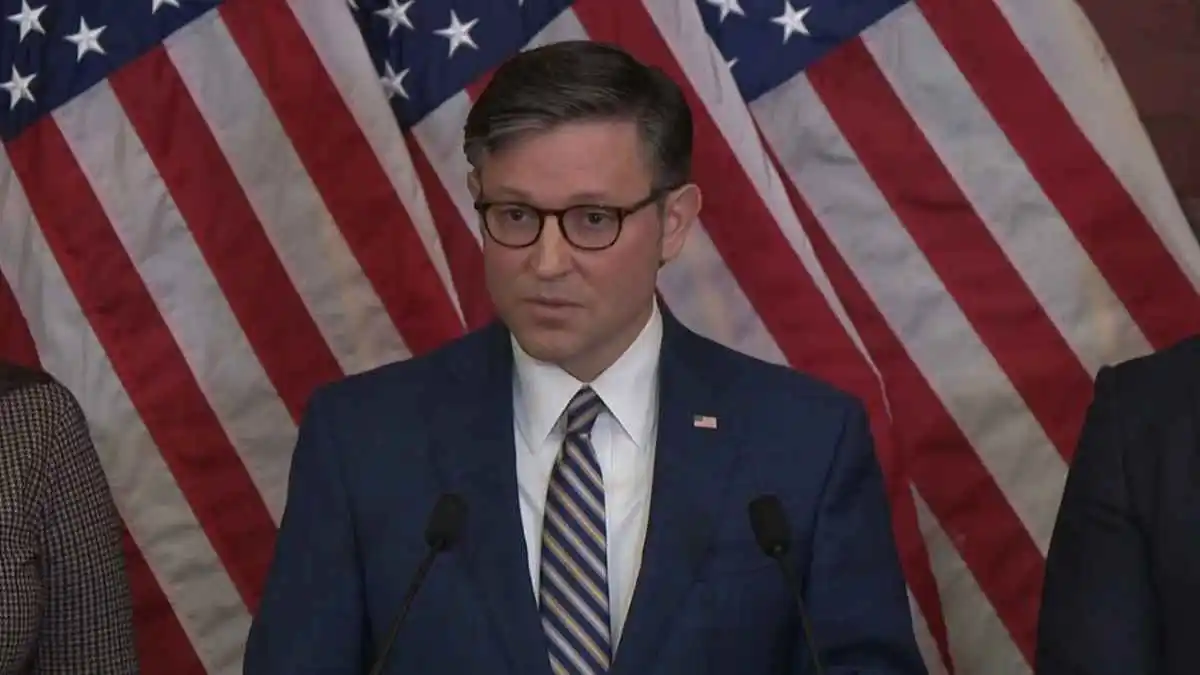
As the end of the fiscal year approaches, the United States faces a potential government shutdown, with critical funding bills stalled in Congress. The situation has escalated into a political showdown, with former President Donald Trump urging House Republicans to vote against their own budget proposals, complicating efforts to avert a shutdown. With the clock ticking, the pressure is on for lawmakers to find a resolution before the government grinds to a halt.
The Current Political Landscape
In recent months, the House of Representatives has struggled to pass a funding bill that would keep the government operational. In late 2023, House Republicans, under Speaker Mike Johnson, rejected their own proposed funding measure, a setback that left the legislative body scrambling for a solution. Johnson had attempted to attach provisions related to immigration and voting rights to the bill, but the inclusion of these contentious issues ultimately led to its failure.
Johnson’s confidence in passing the bill has wavered, as he admitted that a shutdown seems increasingly likely. The government’s funding runs out at the end of the month, and with no clear alternative plan, the country is bracing for the impact of a potential shutdown. While Johnson has promised to keep working on a solution, he has yet to present a definitive plan B after the initial six-month stopgap bill was voted down.
Senate Takes the Lead
While the House remains divided, the Senate has taken steps to try and avert a shutdown. Senate Majority Leader Chuck Schumer has initiated the process of passing a stopgap funding bill that would keep the government funded for another three months, pushing the deadline to December. However, even this temporary solution will require several days of debate and negotiation in the Senate, and it remains unclear what the final version of the bill will look like.
Many lawmakers hope to avoid extending the funding crisis into 2024, as doing so could disrupt key government functions, including a scheduled pay raise for military personnel. With Election Day looming, both parties are feeling the pressure to avoid a shutdown that could have significant political ramifications.
The Pressure on House Republicans
The prospect of a government shutdown has put House Republicans in a difficult position, particularly those in swing districts who are concerned about the political fallout. In conversations with several GOP members, it’s clear that there is growing anxiety within the party about the potential consequences of failing to pass a funding bill. Many Republicans have expressed a desire to avoid a shutdown, recognizing that it could harm not only government operations but also their chances in upcoming elections.
One GOP member commented on the gravity of the situation, stating, “You cannot have a government shutdown. It would be politically beyond stupid for us to do that right before the election because we would certainly get the blame.” This sentiment is shared by many Republicans, who worry that a shutdown would be seen as a failure of leadership and could hurt the party’s image with voters.
Trump’s Influence on the GOP
Despite the concerns of many Republican lawmakers, former President Donald Trump has continued to play a significant role in shaping the party’s approach to the budget crisis. Trump has publicly called on House Republicans to reject any funding bill that does not align with his priorities, urging Speaker Johnson to force a shutdown if necessary. This has created a rift within the party, as some members seek a more pragmatic approach while others remain loyal to Trump’s vision.
Trump’s influence on the Republican Party remains strong, and his endorsement or opposition to any proposed solution could be a deciding factor in whether a funding bill is passed. As the deadline approaches, it remains to be seen whether the GOP will follow Trump’s lead or seek a compromise to avoid the political and economic consequences of a shutdown.
The Consequences of a Government Shutdown
If Congress fails to pass a funding bill by the end of the month, the government will shut down, leading to a range of disruptions. Federal employees will be furloughed, national parks and museums will close, and many government services will be halted. Essential services, such as national security and law enforcement, will continue, but they will do so with limited resources and staffing.
The economic impact of a shutdown could be significant. In previous shutdowns, the loss of productivity and government services has cost billions of dollars, and a prolonged shutdown could have even greater repercussions. Businesses that rely on government contracts could be severely affected, and individuals who depend on federal programs may face delays in receiving benefits.
For the military, a shutdown would mean delays in pay raises and other benefits, adding to the urgency of finding a solution before the funding deadline. Additionally, a shutdown could shake consumer and investor confidence, potentially impacting the broader economy.
What’s Next?
As the deadline for government funding rapidly approaches, all eyes are on Capitol Hill. Speaker Johnson and House Republicans are under immense pressure to find a solution, while the Senate works on its own stopgap bill. The possibility of a shutdown looms large, with the political stakes higher than ever.
Will the GOP manage to come together and pass a funding bill, or will Trump’s influence lead to a government shutdown? The coming days will be crucial in determining the outcome of this high-stakes political battle, and the effects will be felt not only in Washington but across the country.